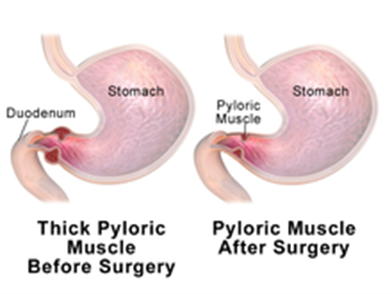A 6-week-old infant with poor weight gain is scheduled for a pyloromyotomy. Which pre-operative nursing action has the highest priority?
Mark an outline of the "olive-shaped" mass in the right epigastric area.
Maintain a continuous infusion of IV fluids per prescription.
Monitor amount of intake and infant's response to feedings.
Instruct parents regarding care of the incisional area.
The Correct Answer is B
Choice A reason: Marking an outline of the "olive-shaped" mass in the right epigastric area is not a priority nursing action. The mass is caused by hypertrophy of the pyloric sphincter, which obstructs gastric emptying and causes projectile vomiting. The mass may not be palpable in all cases.
Choice C reason: Monitoring amount of intake and infant's response to feedings is important, but not the highest priority. The infant may have difficulty feeding due to nausea, vomiting, and abdominal pain.
Choice D reason: Instructing parents regarding care of the incisional area is a post-operative nursing action, not a pre-operative one. The parents will need to learn how to keep the incision clean and dry, monitor for signs of infection, and administer pain medication as prescribed.

Nursing Test Bank
Naxlex Comprehensive Predictor Exams
Related Questions
Correct Answer is C
Explanation
Choice A reason: Feeding the infant every 4 hours is not a specific instruction for home phototherapy, which is a treatment that uses blue light to break down excess bilirubin in the skin and blood. However, feeding the infant frequently is important to promote hydration and elimination of bilirubin through urine and stool.
Choice B reason: Performing diaper changes under the light is not a recommended instruction for home phototherapy, which is a treatment that uses blue light to break down excess bilirubin in the skin and blood. The nurse should instruct the parents to turn off the light and cover the infant's eyes with protective goggles or patches during diaper changes to prevent eye damage or irritation.
Choice D reason: Covering with a receiving blanket is not an appropriate instruction for home phototherapy, which is a treatment that uses blue light to break down excess bilirubin in the skin and blood. The nurse should instruct the parents to keep the infant unclothed except for a diaper and eye protection during phototherapy to maximize skin exposure to the light and increase its effectiveness.

Correct Answer is C
Explanation
Choice A reason: Measuring abdominal girth is not a specific assessment for a client with a suprapubic catheter, which is a tube inserted through the lower abdomen into the bladder to drain urine. However, it may be useful for monitoring fluid status and abdominal distension.
Choice B reason: Assessing perineal area is not a specific assessment for a client with a suprapubic catheter, which is a tube inserted through the lower abdomen into the bladder to drain urine. However, it may be important for maintaining hygiene and preventing infection.
Choice D reason: Palpating flank area is not a specific assessment for a client with a suprapubic catheter, which is a tube inserted through the lower abdomen into the bladder to drain urine. However, it may be helpful for detecting kidney tenderness or enlargement.
Whether you are a student looking to ace your exams or a practicing nurse seeking to enhance your expertise , our nursing education contents will empower you with the confidence and competence to make a difference in the lives of patients and become a respected leader in the healthcare field.
Visit Naxlex, invest in your future and unlock endless possibilities with our unparalleled nursing education contents today
Report Wrong Answer on the Current Question
Do you disagree with the answer? If yes, what is your expected answer? Explain.
Kindly be descriptive with the issue you are facing.
